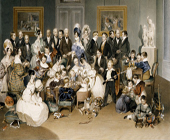Last year, I made a New Year’s resolution that I would make my Sundays Internet-free. It was not easy but, with one small exception, I was able to make a complete break with the worldwide web on Sundays. As we enter 2018, I will be renewing the resolution.
I made the resolution because I was frustrated by how the Internet can waste countless hours. There is so much more to life than emails, websites or social media. I was sickened by the allure of pop-up notifications that never deliver the boost they promise.
Something had to be done.
Making the Break
However, I knew I could not cut off all Internet connections. I needed these links to survive in our modern world. Not having email is the closest thing to non-existence. I also needed to read articles and publications if I were to fight effectively against the evils of the day. The complete no-web option was not, and still is not, an option for me.
However, making Sunday Internet-free is a refreshing and restful option for me and others like me. Sunday was a free day. I did not need to be connected for work purposes. And so I decided to make the break, cold turkey. No Internet, email or social media would be permitted on the Sabbath thus made holy. The break had to be total.
Getting Used to Disconnecting
I must admit it was not easy in the beginning. The desire to check email was constant. Every possible excuse came to mind to shake my resolve. In such a state of withdrawal, the mind fantasizes and tries to create situations that might justify a quick virtual fix. Perhaps there were important messages that needed immediate attention. Maybe there was a schedule change that I needed to know about before Monday.
On one trip, for example, I received an urgent text message on Saturday night informing me that my early Monday morning international flight might be delayed due to weather conditions. I was advised to check the website on Sunday for more information. I resisted the temptation, thinking how I had survived similar situations before the Internet. I calmly went to sleep Sunday night and awoke to find there were no problems at the airport.
Things Could Wait
At times, I found myself helpless. When I needed urgent directions or other information only found on the Internet, I was reduced to the humbling position of asking others to help me. This almost medieval situation helped me rely on the charity of others. It taught me patience. I soon found that I did not have to have everything instantly. Things could wait.
When friends told me that they were going to email me an article or document on Sunday, I had to ask them to print it out or put it on a thumb drive. Likewise, I could not send anything to them and often had to make an old-fashioned phone call. Friends quickly learned not to ask me for things on Sunday. I found they respected my Internet fasting and I suspect that some even envied my state.
The Benefits of Internet Fasting
With each passing Sunday, I found myself increasingly disengaged from the frenetic world around me. I could read and write without interruptions. I had more free time to do things I wanted to do. I would engage in more conversations because frankly there was no other option. Everything was calmer like Sunday should be.
I now find my Sundays uncluttered. It is a welcome break from a frantic pace of life. There is time to think and reflect on things. Being disconnected from the web connects me more to God. It is easier to pray in disconnected silence.
My Reasons for Continuing
Thus, as we enter 2018, I will renew my resolution to keep my Sundays Internet-free. I list again my three reasons for doing so. These reasons come in handy because they steady me in my resolve when tempted.
The first reason is that it is the Lord’s Day. This day is not mine; it is His. It is only right that it be consecrated to God. I should be spending my time thinking about Him and the wonderful universe He created for us, I should be praying, worshiping and giving Him glory.
Secondly, Sunday is traditionally a day of rest. It is proper that we leave our daily rat race for at least one day to ponder and rest to prepare for the week ahead. As we are social beings, it is a perfect occasion to visit and converse with others.
Finally, I believe that a true culture can only come from those who take the time to contemplate the meaning of life during their leisure. The failure to seek psychological repose leads to much anxiety and stress. An Internet-free Sunday is my personal and positive way of contributing to a culture in much need of rejuvenation.
I am not claiming that this one resolution will transform lives completely. After all, it is but one day out of seven. However, it will help people slow down and think about those things that matter.
From experience, I am encouraged by the fact that I know it can be done. I survived Sundays Internet free for a whole year. Others can also do this. It is something practical and feasible for those who are frustrated by their Internet usage. For those looking for a New Year’s resolution, it is well worth a try.
Why I am Renewing my 2017 Resolution to Keep My Sundays Internet-free -: Why I am Renewing my 2017 Resolution to Keep My Sundays Internet-free



